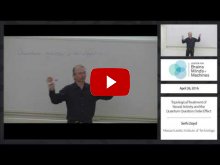 April 26, 2016 - 4:00 pm to 5:30 pm
April 26, 2016 - 4:00 pm to 5:30 pm Seth Lloyd, MIT Department of Mechanical Engineering
Abstract: The order in which one asks people questions affects the probability of their answers. Similarly, in quantum mechanics, the order in which measurements are performed affects the probability of their outcomes. The quantum order effect has a specific mathematical pattern, which -- unexpectedly -- is also obeyed by the human question order effect. This conjunction of the two order effects does not mean that the brain is processing information in an intrinsically quantum way, but rather that certain aspects of neural activity can apparently be captured by a linear projective structure,as in quantum mechanics. I introduce a topological treatment of neural activity and identify topological linear projective structures that might be responsible for the question order effect.
Details
Singleton Auditorium, MIT 46-3002

